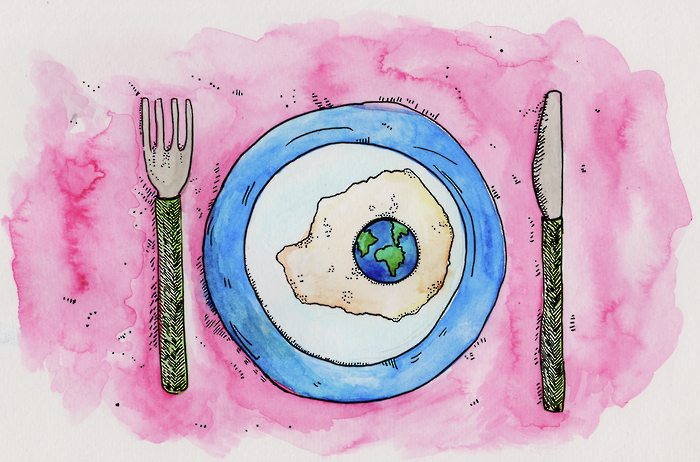Being flexitarian is the best of both worlds
Going ‘flexitarian’ allows you to reduce your environmental impact and improve your health, without needing to feel guilty for eating meat, says Olivia Emily

Arriving in Cambridge last year, I was surprised to discover how many vegetarians were around – not just vegetarians who were animal lovers, but people who consciously chose to be vegetarian in order to help the planet.
I was always a big meat-eater: I like my steak rare, my lamb pink, and my chicken by the bucket-load (preferably a KFC bucket). I used to laugh when my family joked that, one day, like most university students, I would go through a veggie phase. I just couldn’t see that in my future.
But there’s a weird kind of peer-pressure to be more socially conscious at university. There is an abundance of valuable groups in Cambridge that campaign on various social issues, including groups that encourage a more environmentally sustainable lifestyle. Living in this new environment of social responsibility alongside seeing my friends opt for the vegan option at caff made me feel guilty for sticking to my meat-lover guns.
No one has ever pressured me to change my eating habits, but hearing people talk about the state of the planet – about rallying colleges to divest and introduce meat-free Mondays – made me start challenging my deep-rooted views: why am I still eating meat?
“I can pander to the part of me that despises restrictive rules”
Going vegetarian for the environment remains a minority movement: it’s very much reliant on individual people feeling a pressure to change their eating habits based on witnessing the climate crisis. Indeed, livestock makes up 18% of global greenhouse gas emissions (exacerbating global warming) – but it is also detrimental to the planet in terms of deforestation, land degradation, and excessive water use and pollution.
I’m also motivated by the health and economic benefits: consuming meat is bad for your health, and a meat-based diet is generally considered to be twice as expensive as a vegetarian one.
My New Year’s resolution for 2019 was to give up one meat per month. In January, this was pork – I never really liked it, and cured pork (like ham and bacon) is terrible for your health, so I figured it was a good place to start. February was beef – a big one for a steak-lover, but a necessary one for the planet. I gave up lamb in March, and by April had decided to cut out all red meats entirely.
While I agree that we shouldn’t always feel like we have to label ourselves, as of November, I would call myself a flexitarian: I have a maximum of one meal per day with meat in it and the only meats I eat are poultry and fish; I check ‘vegetarian’ as my dietary requirement for events; I avoid dairy products where I can.
Whether you’re a fully-fledged meat-eater wanting to do better or would call yourself a flexitarian too, there are ways we can help the planet without making huge sacrifices:
Milk substitutes
Dairy farming is one of the biggest contributors to the greenhouse gas emissions that cause global warming. My personal favourite milk substitute is oat milk (Oatly Barista is incredible in coffee!), but other options include soy, almond and rice milk. Switching to a milk substitute is quick and easy (supermarkets stock most of these options), and reduces the demand on this industry.
Meat-free meals or days
We don’t typically have meat for breakfast, so leaving meat out of lunch isn’t too much of a stretch! Not eating meat for one day of the week is also very doable. I try to have at least one meat-free day a week, and 2 meat-free meals per day.
One meat at a time
I found that cutting out one meat at a time made switching into flexitarianism a lot easier. I don’t miss pork because I haven’t had it for so long now, but also because I can satiate that desire with other things. The most damaging meats for the environment are beef and lamb because of the animal’s grass-based diets, so if you’re feeling environmentally conscious, they should be the first to go.
Flexitarianism is the best of both worlds. I can live an ethical vegetarian lifestyle (most of the time) without feeling guilty if I do eat meat. I can pander to the part of me that despises restrictive rules – like not being able to eat meat even if I’m craving it. I can get the health benefits of a diet without red-meat whilst also satiating my desire for meat with chicken or fish. It’s not a perfect diet, but it’s an accessible place to start if you don’t quite want to commit to vegetarianism just yet.
 Arts / Plays and playing truant: Stephen Fry’s Cambridge25 April 2025
Arts / Plays and playing truant: Stephen Fry’s Cambridge25 April 2025 News / Candidates clash over Chancellorship25 April 2025
News / Candidates clash over Chancellorship25 April 2025 Music / The pipes are calling: the life of a Cambridge Organ Scholar25 April 2025
Music / The pipes are calling: the life of a Cambridge Organ Scholar25 April 2025 Comment / Cambridge builds up the housing crisis25 April 2025
Comment / Cambridge builds up the housing crisis25 April 2025 Comment / Pick an exam format and stick to it25 April 2025
Comment / Pick an exam format and stick to it25 April 2025







